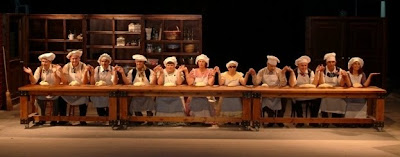
Sometimes the simple fact of a show’s occurrence is all it takes. Consider the work of the Free Theatre of Belarus, a company that must defy political censorship and runs the risk of prosecution with every production. In the same way, the mere existence of Not By Bread Alone, which is performed by a cast of eleven deafblind actors, is astonishing in and of itself. It counts not as acting, but as an act: hard-earnt, brave, determined, defiant.
Loosely put, in terms of content, the actors make bread – from the kneading to the sharing – and, while it bakes they share their stories and dreams, reminding us that no-one can live by bread alone. Life, no matter one’s circumstances, is more than mere survival. The double-edge, although it is a piece grounded in generosity, is a soft reprimand for any preconceptions about their capabilities and attitudes to life.
At times the actors are led into position by sighted stage-hands, who double as translators of sign language. Sometimes they cut free, bounding across the stage in a manner that strikes you as almost reckless, or else they count their steps privately or form people-chains to navigate their way together, totally trusting. Cues come in the form of unostentatious taps on shoulders or the vibrations of a drum. To us, reliant on sight and sound, it seems unthinkable, but watching these men and women not just cope, but make a show of it, you swell with admiration.
More than that, though, the show wears its process openly. At some point, as you watch them pass messages like Chinese whispers passed hand to hand – sign language functioning like moving Braille – you think of the difficulties in creating the piece in the first place. Any collaborative process of creation is dependent on communication and, in their case, that becomes an entirely different proposition. Not By Bread Alone, you come to realise, represents two years of exhaustive teamwork and that’s inspirational.
Of course, the company (and their achievement) comes with political connotations on the basis of its location. The Nalaga’at Centre (Hebrew for ‘do touch) is based in Israel and the company – its more than the eleven-strong acting ensemble – includes Jews, Muslims and Christians. It’s undeniably hopeful in spirit.
Watching it, of course, you become aware of the individual’s behind the disability, their mannerism and kooks, as well as their hopes and fears. But the most curious element is the effect of their disability in terms of performance. What, I kept thinking, does it mean for us to be watching people who have to be told of our presence, not to mention our response? What does it mean to watch someone who can’t watch you back or have any sense of you as an individual? What does it mean to clap appreciatively, to participate or, alternatively, not to do so?
I shan’t gush over the actual content of the performance itself, though it does feel easy to let that impulse run away with you. There was a certain simplicity of thought and broadness of poetry that prevented me from getting lost in it. However, that hardly matters. I looked on with the greatest of respect, perhaps even slightly proud of our species. That matters. This matters.
0 comments:
Post a Comment